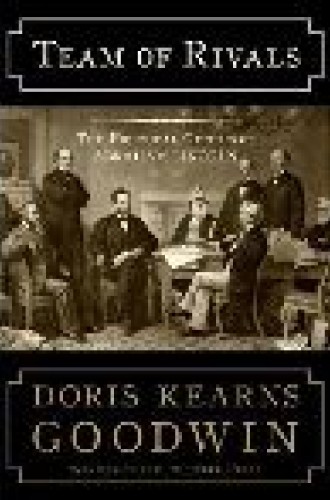Team of Rivals: The Political Genius of Abraham Lincoln
Team of Rivals enjoys a first printing of 400,000 hardcover copies, it is the featured selection of two prominent book clubs, and its film rights have been assigned to Steven Spielberg. Somewhere in all that present and anticipated ballyhoo lies a major source of this book’s central problem. Goodwin undoubtedly wanted her Lincoln book to be both a well-executed popular success and an original contribution to scholarship.
Some outstanding authors have had the good fortune to produce brilliant history that also scored with the general public. But Goodwin’s book is not particularly well written: her prose is devoid of style, her transitions are often awkward at best and nonexistent at worst, and her language incorporates such expressions as comprised of and utilize. Nor is her work brilliantly insightful. Although the author has not quite, as the British say, fallen badly between two stools, she has produced a book that is more likely to be a success with a broad audience than to be read with great profit by anyone who is already familiar with the Lincoln story.
Which is not to say that this latest entry in the popular-history sweepstakes lacks a worthwhile approach, valid insights or lovely moments along its lengthy, winding way. Goodwin’s decision to make the first half of her volume a four-way biography featuring Lincoln and his rivals for the 1860 Republican presidential nomination—Edward Bates, Salmon Chase and William Seward—was a good one. This approach enables her to juxtapose the histories of these four politicians and to let the reader see, in the political and social context of the antebellum period, both what they shared and what distinguished them from one another.
This first section would have made a good 300-page monograph, in which Goodwin could have presented her view of Lincoln more sharply, taking into account both what scholars have already written on Lincoln as prewar lawyer-politician and what objections might be raised to her interpretation. Instead, Goodwin goes on in the second half to offer a fairly standard narrative about Lincoln as war leader, emancipator, devoted father to Willie and Tad, and patient husband to the endlessly trying Mary.
For readers interested in American religion, this book will be a disappointment. The holder of a Ph.D. in government from Harvard, Goodwin demonstrates no real grasp of 19th-century Protestantism in general or of Lincoln’s faith in particular. Usage, though a minor problem, reflects her limited background. She refers to “Reverend Gordon,” for example, and says that Salmon Chase was “baptized Episcopalian,” when surely Chase would have said that he was baptized a Christian in the Episcopal Church. Another problem is that Goodwin never connects Lincoln to the Christian tradition—Calvinism, partly by way of Old School Presbyterianism—with which he had some affinity. She never even makes it clear that he attended the New York Avenue Presbyterian Church or that he enjoyed an association with its pastor, P. D. Gurley, whose name she cites twice.
More important, her research appears not to have included consultation of any of the excellent recent commentaries on Lincoln’s theological outlook by, for example, Mark Noll, Joseph Fornieri and Ronald White, or, for that matter, the valuable older studies by William E. Barton and Reinhold Niebuhr. The little that Goodwin does say about Lincoln’s religious views contains no analysis on her part; her treatment of his faith is invariably superficial and restricted and is especially dependent on quotations from others. The image presented in Team of Rivals is of a Lincoln whose statements about God stand alone, unconnected in any meaningful way to his views on slavery, his approach to the problem of suffering and evil, and such essential character traits as humility and prudence, the salient virtues that Goodwin acknowledges Lincoln manifested time and again.
In short, Goodwin fails to inquire into the relevance of Lincoln’s deepest beliefs to his greatness as a statesman—the very theme that she is otherwise so concerned to analyze. If the research of the past 25 years has revealed nothing else, it has demonstrated that no one can do justice to either the personal or the public Lincoln without gaining an understanding of his theological outlook.
Every time Goodwin takes up a significant theological utterance by Lincoln, she lets it drop. “God’s purpose [may] be something different from the purpose of either party,” Lincoln said; the responsible historian needs to discuss the religious context and significance of this statement. “Surely,” Lincoln told Eliza Gurney, “[God] intends some great good to follow this mighty convulsion, which no mortal could make, and no mortal could stay.” What does Goodwin make of this apparently strong view of Providence? When she comes to Lincoln’s Second Inaugural Address, she notes that the speech “fused spiritual faith with politics” and observes that Lincoln sometimes “questioned the higher force that shaped human ends.” By using “higher force” does she mean to say that Lincoln believed in an impersonal God? At this point in the narrative the reader senses that it would do no good to ask.
Finally, two elements combine to make this book less than reader-friendly. In the main text the author often fails to make clear whom she is quoting, and the citation format is less than helpful. The back-of-the-book citations are linked to the text not with numbered note references, but with main-text page numbers followed by short, quoted phrases. Although I did not find in this latest tome reason to resurrect the charges of inadequate documentation that dogged Goodwin’s scholarly steps following the publication of The Fitzgeralds and the Kennedys, it is difficult for readers to determine without undue labor who is the source for each quotation.






